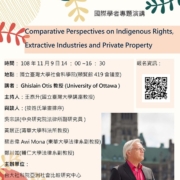Comparative Perspectives on Indigenous Rights, Extractive Industries and Private Property
Indigenous land claims often clash with private property. In Canada, like in other countries, tribal groups claim aboriginal title to large tracts of land that are today in the hands of private owners. They sometimes serve eviction notices to rail companies, logging and mining corporations because they want them to know that they are on indigenous land and that use of such land without prior indigenous consent will no longer be tolerated. Focusing mainly on Canada, this presentation will look into the difficult legal issue of reconciling the recognition of indigenous land rights with private interests. The speaker will explain how, despite the long-standing government refusal to acknowledge indigenous claims to privately owned land, the granting of fee simple title to third parties without indigenous consent does not in itself validly extinguish preexisting aboriginal title. As a consequence, the infringement on indigenous land rights resulting from land grants to third parties must be redressed. However, the speaker will demonstrate that, barring exceptional cases, restitution is not likely to be regarded as a just and appropriate remedy by Canadian courts. Alternatives to restitution will then be put forward. The presentation will conclude with a summary review of the law in countries other than Canada.




